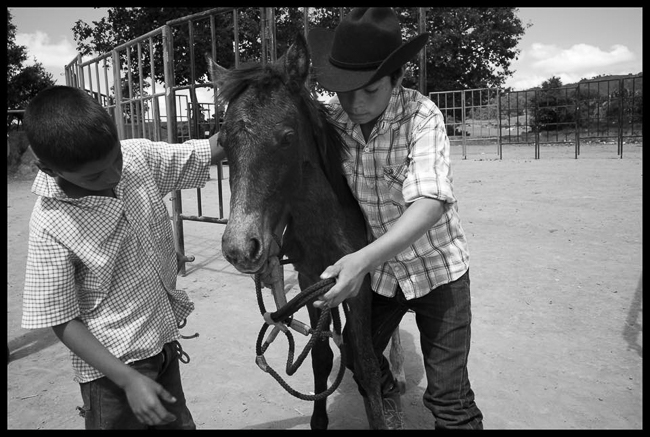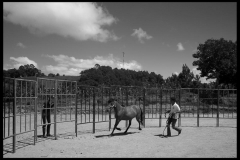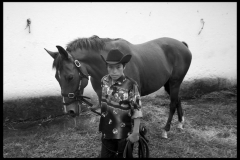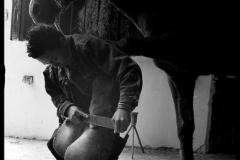Lead-Up: Peaceful Horsemanship. Recently, my friend and writer Asa told me about a unique Horsemanship program being run in Guatemala. The results her friend Katie is experiencing are amazing. Here’s the story about the Lead-up program in Guatemala: Producing non-aggressive leaders of the future, throughout the developing world. I am proud to share it with you.
By Åsa Björklund, www.saraguate.com
Images: Santiago Albert, Åsa Björklund.
Lead-Up: Peaceful horsemanship reduces violence among people
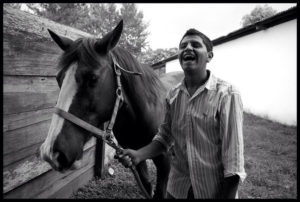 Before moving to Arizona I lived in Guatemala, Central America, where I was fortunate to make friends with a wonderful and talented woman, Katie Cunningham, from England. In addition, she loved horses so we were up for a good start!
Before moving to Arizona I lived in Guatemala, Central America, where I was fortunate to make friends with a wonderful and talented woman, Katie Cunningham, from England. In addition, she loved horses so we were up for a good start!
Katie lives the life of any horse aficionado’s dream. She and her husband own a coffee farm, La Azotea, in the colonial town Antigua, Guatemala. On the property Katie runs the La Ronda stable and riding school. After class, I remember riding through the lush greenery of the coffee farm, the volcanoes watching over me from afar like gentle, gigantic guardians. My own pleasure aside, most important was how pivotal equine welfare was at La Ronda, a direct result of Katie’s passion for horses. If a horse was injured or sick, Katie went above and beyond to cure it.
More recently, she founded the Lead-Up program as a way to help Guatemala, where violence is rampant. This equine-assisted program seeks to reduce violence in the community by creating peaceful leaders. The goal is achieved through workshops with horses that teach vulnerable youth about non-violent communication, trust-based relationships and peaceful leadership.
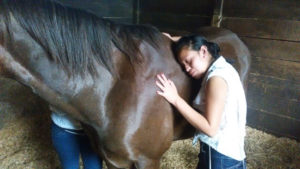 In July, scientific evidence was presented in the International Journal of Adolescence and Youth that the Lead-Up program was effective in promoting leadership and emotion regulation and in reducing aggressive behavior.
In July, scientific evidence was presented in the International Journal of Adolescence and Youth that the Lead-Up program was effective in promoting leadership and emotion regulation and in reducing aggressive behavior.
“We are thrilled to have evidence that the Lead-Up program is effective. Violence has become so ubiquitous in 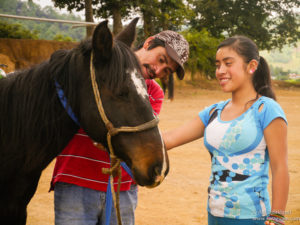 societies everywhere that we have begun to think of it as the norm. We don’t want to succumb to a world where people are afraid; we want to create a new generation of peaceful leaders. We have a vision of a much better world for all people,” said Katie at the presentation of the report.
societies everywhere that we have begun to think of it as the norm. We don’t want to succumb to a world where people are afraid; we want to create a new generation of peaceful leaders. We have a vision of a much better world for all people,” said Katie at the presentation of the report.
A couple of years ago, Katie invited me to attend one of the workshops in Guatemala. I remember driving on small, windy roads to get to Las Lomas, a village where Lead-Up was carrying out a practical graduation exam. Clouds loomed over the soccer field where the participants had gathered. Most of them were young men wearing cowboy hats and boots, but a couple of girls had also braved the gender stereotypes in Central America, where livestock is considered a man’s responsibility. Impeccably dressed, despite living in simple tin-roofed huts with dirt floor, the participants stepped into the center one by one with their skinny horses to show the training skills acquired during the program. Their horses were pack animals used to carrying heavy loads of firewood or crops from the fields in this farming community.
Before attending Lead-Up, the participants treated their horses much like everyone does in Guatemala; with coercive methods and violence. After the workshops, however, they had realized that peaceful horsemanship is actually a more effective training and communication method. Yet, the positive results went beyond equine welfare to include human relationships. As the scientific report concluded, violence among the participants and their family members was also reduced as a result of the Lead-Up program.
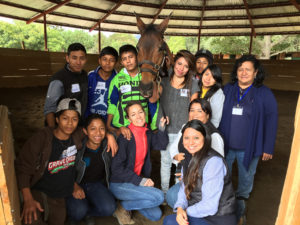 “Lead-Up helps participants learn how to improve their self-awareness and regulate their body language and emotions through specialized interactions with horses and specifically through the embodied experience of Join-Up ®. Participants intrinsically learn that violence is not necessary and that they can be powerful yet peaceful leaders through self-awareness and better control of body language and emotions,” Katie explained, referring to Join-Up®, a non-violent training system based on the horse’s inherent communication and herd-behavior. Katie’s mentor Monty Roberts, the famous “horse whisperer,” developed Join-Up®, whose result is a willing partnership between horse and human based on mutual respect and trust. Lead-Up is an affiliate program of Join-Up International.
“Lead-Up helps participants learn how to improve their self-awareness and regulate their body language and emotions through specialized interactions with horses and specifically through the embodied experience of Join-Up ®. Participants intrinsically learn that violence is not necessary and that they can be powerful yet peaceful leaders through self-awareness and better control of body language and emotions,” Katie explained, referring to Join-Up®, a non-violent training system based on the horse’s inherent communication and herd-behavior. Katie’s mentor Monty Roberts, the famous “horse whisperer,” developed Join-Up®, whose result is a willing partnership between horse and human based on mutual respect and trust. Lead-Up is an affiliate program of Join-Up International.
So how does it work? The participants (youth at risk aged 15-24) are welcomed into a compassionate and non-judgmental environment, far removed from the violence, abuse, addiction and neglect they often experience at home. Lead-Up’s specific objectives are to see attitudinal and behavioral change resulting in the reduction of violence used to solve inter-personal conflicts (i.e., domestic violence, youth violence, and intra-familiar violence). A workshop takes place over two full-days, and includes a feedback session as well. Participants are taught to control body language, breathing, stress levels and emotions when interacting with horses. Horses are herd animals that seek leadership. Within minutes of a participant demonstrating calm and assertive leadership the horse willingly chooses his leadership and walks towards him; the moment of “Join-Up.” It’s a powerful and life-changing experience. These new skills are then related to adverse situations and relationships in the participants’ lives. Clinical psychologists are on hand at every step and further coaching and therapy is provided for the youth who need special attention. Core objectives include:
- Improvement of participant’s emotional regulation
- Development of peaceful leadership skills in each participant
- Improvement of participant’s self-efficacy
News of Katie’s successful work with horses and people in Guatemala has traveled around the globe, culminating in Queen Elizabeth II recognizing Katie for her efforts to reduce violence in Guatemala. Queen Elizabeth is following the development of the Lead-Up program.
It’s a long way from Windsor Castle to Guatemala’s villages, so it’s comforting to know they are in the minds of people around the world. After the graduation ceremony I attended, we were all spontaneously invited for a delicious lunch of chicken soup and homemade corn tortillas at the humble home of one of the participants. Content and happy, we all chatted while chickens strolled under the table, searching for crumbs. Amid such stark poverty, I was deeply moved by the families’ generosity and willingness to break old habits. Lead-Up is carried out with a minimal budget but with a lot of skill, ingenuity, and, above all, a conviction that we can create meaningful change if we put our minds to it. If so much can be achieved with so few means, the future of villages like this seems bright.
For more information about the program, donations or to schedule a presentation, write to Katie Cunningham at: katie@join-up.org. Also, Lead-Up International is seeking Founding Members to help launch a broader campaign to share these workshops with more organizations, people and horses.
Two studies by Judith Gibbons PhD and team were published in the Human-Animal Interaction Bulletin and in the International Journal of Adolescence and Youth. The latter can be accessed at:
http://www.tandfonline.com/doi/abs/10.1080/02673843.2016.1202844.
